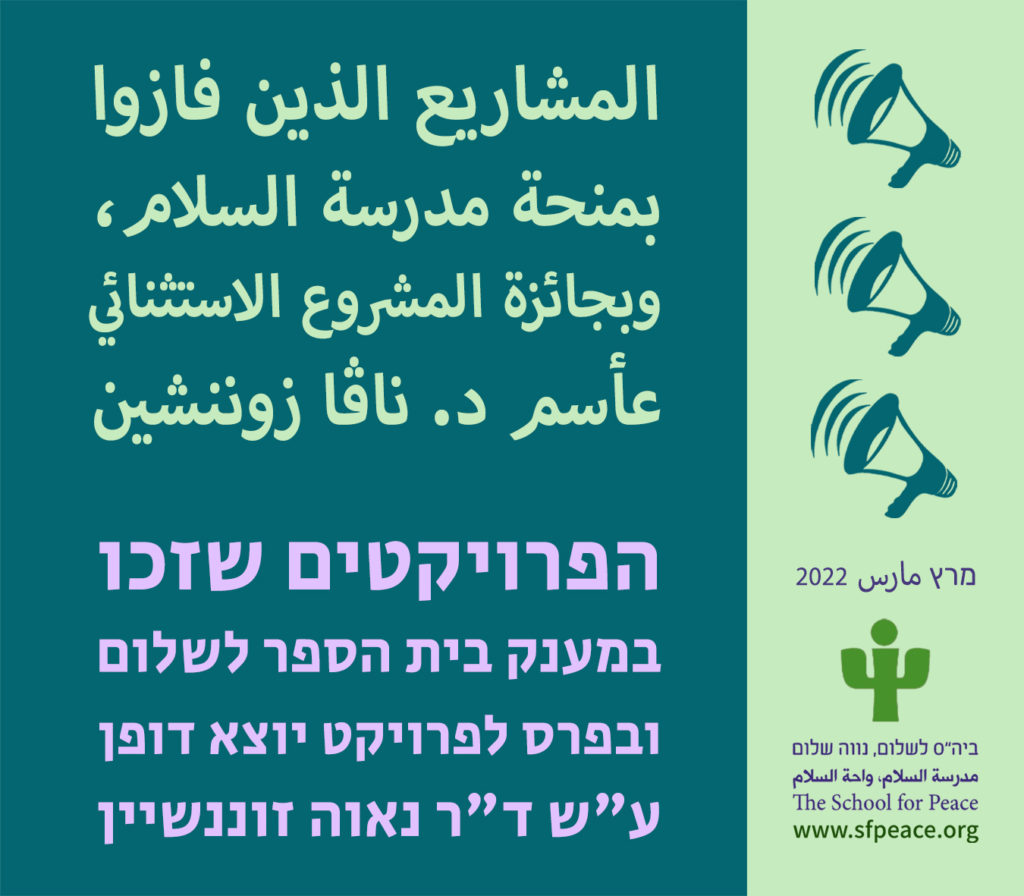School for Peace grant awards 2022
The School for Peace in November 2021 published a call for applications for project grants along with a special award for an outstanding project. This is the second such call by the SFP as part of its efforts to encourage grassroots project initiatives by graduates of its professional training courses. The grants support projects that advance SFP goals by promoting a more humane, egalitarian and just society. The funds assist programs working toward achieving peace, tackling social and political issues, seeking equality between Jews and Palestinians, and promoting a just solution that could end the Israeli-Palestinian conflict, the occupation, and the oppression.
Sixteen projects submitted applications. The awards committee chose one outstanding project to receive the Dr. Nava Sonnenschein Prize of NIS 16,000, along with 7 other projects awarded grants of NIS 4,000 each.
Selecting the winning projects was no easy task, given the field of excellent candidates before the evaluation committee, comprised of Haifa City Councilwoman Ms. Shahira Shalabi of the Haifa Front; Retired Justice Limor Margolin-Yehidi and Member of Knesset Sami Abu Shehadah, chair of the Joint List’s Balad party. In making their selections, the committee sought to identify the projects promising the greatest transformative impact and the best prospects for successful implementation, with preference to those involving cooperation with SFP course graduates or with other organizations identified with the goals and work of the School for Peace.
The Dr. Nava Sonnenschein Award was won by Bustan Nof Hagalil, managed by Dan Segal, Yaara Alef-Dekel, Adam Shvadron and Ahlam Daniel. The Bustan project is a social change initiative established in 2018 by a group of Arab and Jewish Nof Hagalil residents. Their vision is to transform Nof Hagalil from a mixed city into a shared city. They envision a positive everyday interface between their city’s varied populations, enabling every resident to feel at home and welcome, with a shared pride in their city as they share equally in its material and cultural resources.
This initiative seeks to achieve an altered awareness of the nature of a shared society both among residents and also at city hall. The heart of the project is a community of members seeking to develop cooperative leadership and to create a range of opportunities for one-time and ongoing encounters between neighbors from all the city’s cultures: community events for everyone, a course in Non-Violent Communication, a family outings group, and other projects. The group disseminates positive discourse on social media and works against political and organizational violence and racism, while encouraging cooperative efforts with the Nof Hagalil municipality.
The other seven winning projects are:
- The Honey Path (Derekh Hadvash): An educational-environmental-community project encouraging encounter, dialogue and cooperation between Arabs and Jews through shared bee-keeping. Project directors are Rajai Hameed and Ziv Elyashiv.
- New Dawn (Hashachar Hechadash): A young leadership program promoting youth leadership training in Bedouin and Jewish communities in the Negev, aiming to influence the social media discourse and emphasizing positive attitudes toward others who are different. The project is led by Jamal Alkarinawi, founder and CEO of the New Dawn organization.
- Crossings: a Journal of Psycho-Political and Cultural Thought in Israel. This is an internet-based magazine meant to create a space for thinking and writing about issues like majority-minority relations and hegemony and oppression between Jews and Palestinians in Israel, both within the therapy room and beyond. In the process, the journal provides a platform for writing addressing the complex implications of the occupation at the mental and collective levels. Project leaders and editors are Muna Karkabi-Salameh, Tova Buxbaum, Rotem Zamir, Esther Rapoport and Ortal Levi.
- Streets of Jaffa is a project seeking to reintroduce the historical street names of Jaffa from before 1948 in today’s public space through symbolic acts in cooperation with the local community. The street signing will be accomplished in various ways: with signs in windows and on terraces, with street signs painted on the walls of buildings, with graffiti and so on. In addition, the project will be charted in a video documentary to preserve a record of the cumulative actions as the work proceeds. Project leader: Rachel Hajaji.
- Mental Health Professionals Against Child Arrests: Arrests of Palestinian children are a widespread phenomenon in the West Bank and East Jerusalem – a practice that systematically violates children’s rights under both international standards and Israel’s own laws. The project is working to raise awareness of this phenomenon among mental health professionals, alert the general public to its dimensions and ramifications, and engage decision-makers in the struggle to alter these practices. The project also provides support and assistance to the people offering aid directly to victims of child detention. Project leaders: Moriah Shlomot and Michal Fruchtman.
- “My Family Hates Arabs”: This documentary film portrays the complex relations between Jews of Middle Eastern descent and Arabs wherever they may be, particularly Arab citizens of Israel and Palestinian Arabs – from a personal perspective. Project leaders: Lilach Gavish, Yitzhak Ruben.
- Urban renewal in the Mandatory Quarter of Acre (Akko): The project aims to be supportive to residents of the historic Mandatory Quarter of the city of Akko and inform them about the urban renewal process being promoted by the municipality in the city center. The object is to create an alternative public engagement process, raising awareness among the city’s residents about the scope and impact of planned urban renewal efforts. Project leadership: Hazar Badin.
Watch the Panel from the Graduates’ Conference in which the projects were presented: Original Languages | Hebrew | Arabic

